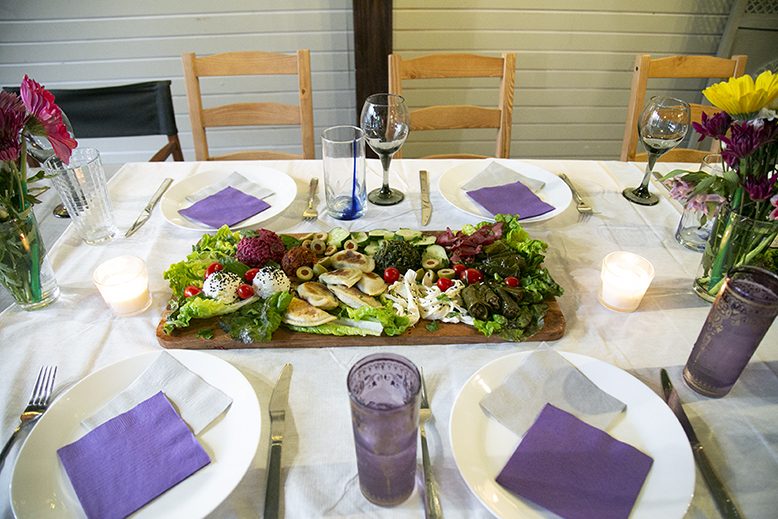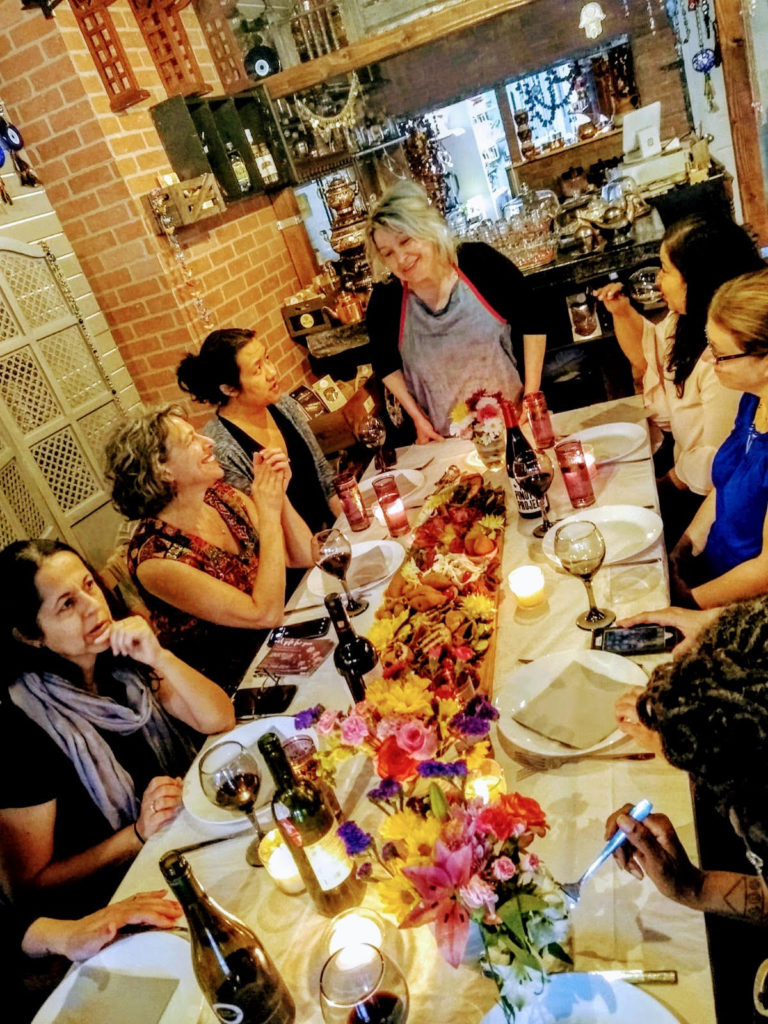
Jumana Jaber will be the first to tell you: dinner at her shop Le Souk in Montclair isn’t your typical night out. For one thing, it’s private, scheduled in advance, and all in the hands of Jaber herself, an award-winning artist and designer from Syria. A self-taught cook, she prepares each menu and serves them at one large table—a succession of dishes over the course of more than two hours, all suffused with Syrian culture and flavor. It’s a celebration of human connection that’s as ancient as the act of breaking bread, a relic of what Jaber left behind in Damascus.
No surprise, it’s gaining momentum, putting Jaber in a position to continue growing the concept she opened two years ago. And while she plans to return to teaching art at Montclair State University (she taught there for five years, taking a break to focus on her shop), Jaber has larger ambitions for the mission of Le Souk, not least among them adding a resoundingly positive note to the Syrian narrative here in America. “I’m trying to run a business,” she told us, “but my goal is bigger than business. It’s about life as a whole, and being human.” We caught up with her to ask just what that means for her, for diners, and for the future of Le Souk.
Table Hopping: How did you come from Damascus to a storefront in Montclair?
Jumana Jaber: After the war [began], we came here. I left everything. I was a professor at Damascus University. My husband was the dean of the art college. We were forced to leave—our house, our car, studio, career, history. We closed our house and gave the keys to our neighbors and said, “Goodbye. Please take care of our stuff.” I opened my store two years ago. When I started, I had only a few tables. I didn’t have enough money to do anything. I had to go little by little. I’m still working on my kitchen!
TH: What does “Le Souk” mean?
JJ: Le souk means “the market” in the Middle East. Le souk in our culture is similar to the Roman square where life and everything takes place. At le souk, you can find everything—you can buy, you can gather, you can meet new people. I used to be part of the souk in Damascus. I passed through it every day. I’ll never forget the colors, the light, the smells of the spice, the layers of the ancient buildings and civilization you can see.
TH: Was that your goal—recreating that, or a piece of that, here?
JJ: I wanted to create a small example of the souk where I can gather people, cook for them, sell them something, let them sip tea, let them listen to music. When I serve people here, I’m acting like the craftsmen and artisanal food purveyors from le souk [in Syria]. I’m trying to do what they used to do. It makes me feel like I’m back in Damascus, sharing my culture with people in Montclair.

Jumana Jaber at the head of the table at Le Souk in Montclair. Photo courtesy of Le Souk
TH: Is that why you’re doing the planned, large-format dinners and not simple nightly table service?
JJ: Yes. It makes me feel like I’m cooking for everyone, like a family, the same way I used to do in my home country. This is very important in my culture. [In Syria], I used to have a dinner every month. All of our friends came. When I came here, I felt like I was missing that. It’s a different style of life here—more stressed and fast-paced. Food means a lot to Middle Eastern people. If you cook something, you should think about your neighbors. We name it sikbeh. Sikbeh means “a little bit for my neighbor.” [You would say:] “Oh I cooked today, where is my neighbor’s sikbeh?” Then the neighbor gives you back the dish with something they cooked. This is sikbeh.
That’s why I added the food [to Le Souk]: culture makes people connected. There’s a phrase, “If you eat with somebody, that means you share the salt and bread.” It means you are connected, a very strong connection. In my culture, if you eat bread with someone, you shouldn’t forget that you are close to him.
TH: Speaking of bread and salt, what about the menus themselves? A recent dinner of yours had dishes like Pomegranate Chicken, Syrian Za’atar Pizza, even a Falafel Waffle with tahini and pickles. What flavors should a diner expect to see?
JJ: We use a lot of different spices: dried mint, cinnamon, cumin, sumac, garlic, olive oil, lemon. My food also includes very special Mediterranean flavors, pomegranate syrup, yogurt, tahini. What is [also] rich in my story about food is that my menu, my experience, is varied because I lived for seven years in Poland, a few years with a Polish lady who was an incredible cook. She taught me how to cook Polish foods. My menu—which I’m still working on—includes two or three dishes from Poland that I learned. Bigos, in winter, pickled cabbage with sausage and meat, I used to eat it as a student, and Ryba po Grecku, a Polish fish dish.
TH: Are there any other influences on your menu, any other countries?
JJ: Lebanese. [In Syria], we [would] go to Lebanon every week, they would come to us. It’s like here to New York City. I used to go there and eat every week, so my food experience includes all this mix. I love the way Americans do food—I try to incorporate what I like from American food as well.
TH: Do you feel a responsibility—bridging a pretty vast culture or knowledge gap?
JJ: My goal here is to put the spotlight on Syrian culture, music and art. Americans only know the bare minimum, the things that are very popular on the street or in restaurants in Syria. They don’t know what people really eat at home, with their families—the real homestyle food we eat in our homes. I’m going to do a special every week or every month to introduce these very traditional and delicious dishes.
TH: What are some examples?
JJ: Shakriya, yogurt with lamb and rice. Maqluba, rice and eggplant and meat and tomato. This is my favorite. Everyone around me in Syria [would say] “Jumana’s Maqluba is the best!” And kibbe. Americans know this, but they might only know the simplest kind. But there are so many—one with sumac, one with yogurt, one grilled. We have 12 different types of kibbe. I never saw any one of them anywhere [in America], not in one restaurant.
TH: Many Americans know about Syria almost exclusively through the lens of conflict. Are your dinners partly a way to expand on that narrow focus—to bring something positive to the narrative?
JJ: It’s true that Syria is in a bad situation, but we can’t forget Syria has a very long history. [Damascus] is the oldest city in the world that has been continuously alive. I hope Syria is going to [come] back because of this longstanding history. I meet a lot of American people in my store who have been to Damascus. They say it’s beautiful, full of culture and civilization. When they talk to me, their eyes well up. They feel pain about what’s happened.
As a person in exile, I miss my friends and family back home, so I created this place. I left all my memories back in Syria, so I try to build memories with my customers and friends here. I put in this store my culture, my memory, my arts, and my love.
TH: What about your own future here at Le Souk? Any plans on expanding?
JJ: I already hired one person [to help cook]. [And] a lot of people have requested cooking classes. So I’m going to teach them, in their houses, and cook for them. And I would like to present and sell my art in my store. This is my next step. But this isn’t about turning Le Souk into a commercial experience. I care about people more than profits.
Le Souk is located at 51 Watchung Plaza in Montclair. Private party dinner reservations (for roughly 10 or more) can be made with advanced reservation, but Jaber is working on ways to advertise open, pre-scheduled dinners at Le Souk for those looking to dine but without a large group to bring. In fact she has begun advertising dinners on Airbnb, with an August 5 dinner with room for 10 diners currently taking reservations. Jaber is currently on vacation, so all immediate inquiries should be routed through email: [email protected]. (Otherwise call 973-707-2333). If you do schedule a dinner, “Come hungry” is the advice—and be prepared to experience with all your senses. “During the dinners, my son, Yazan, who’s a professional musician will play the oud, a very old, traditional Syrian instrument. He loves getting the guests to interact and share in this traditional Syrian music.



